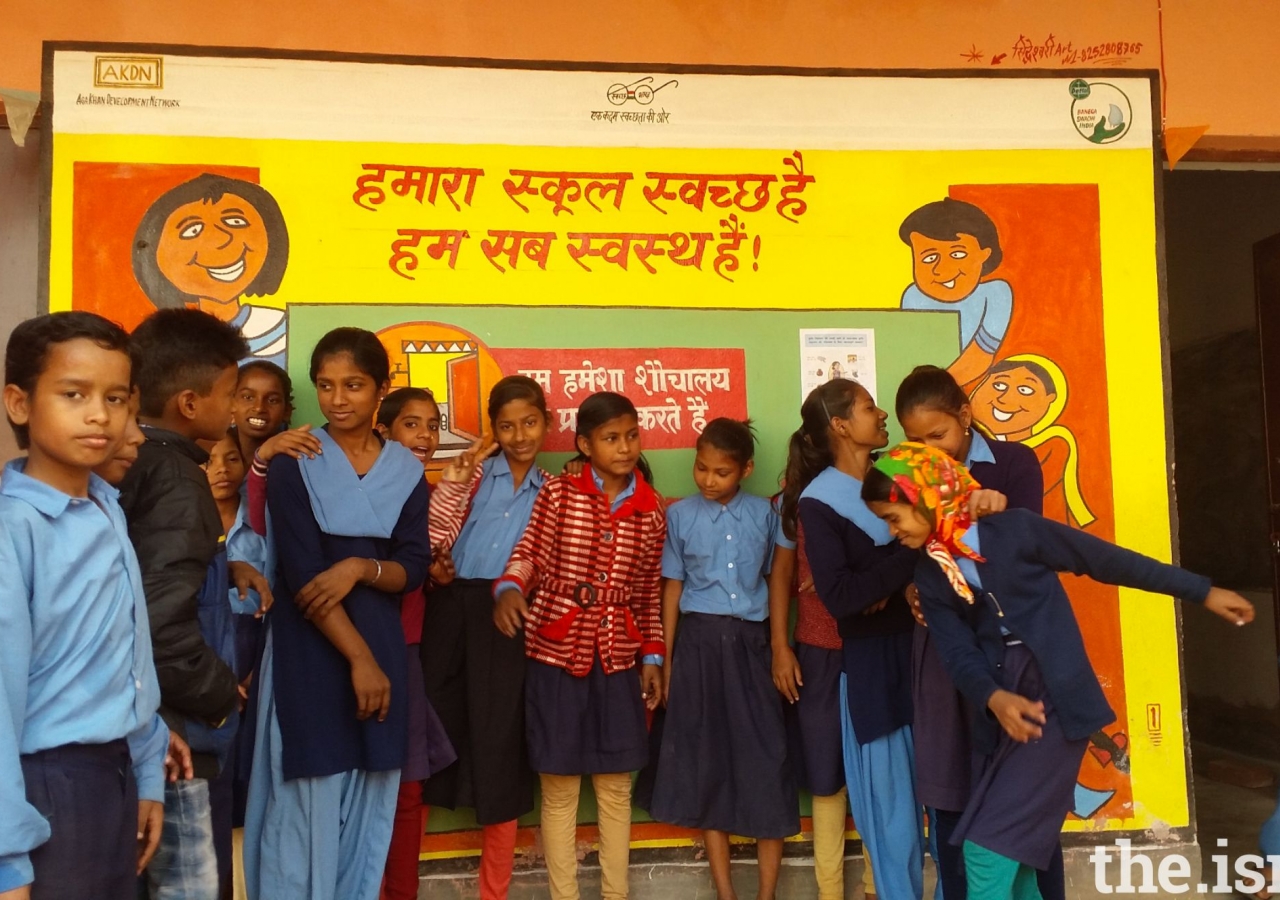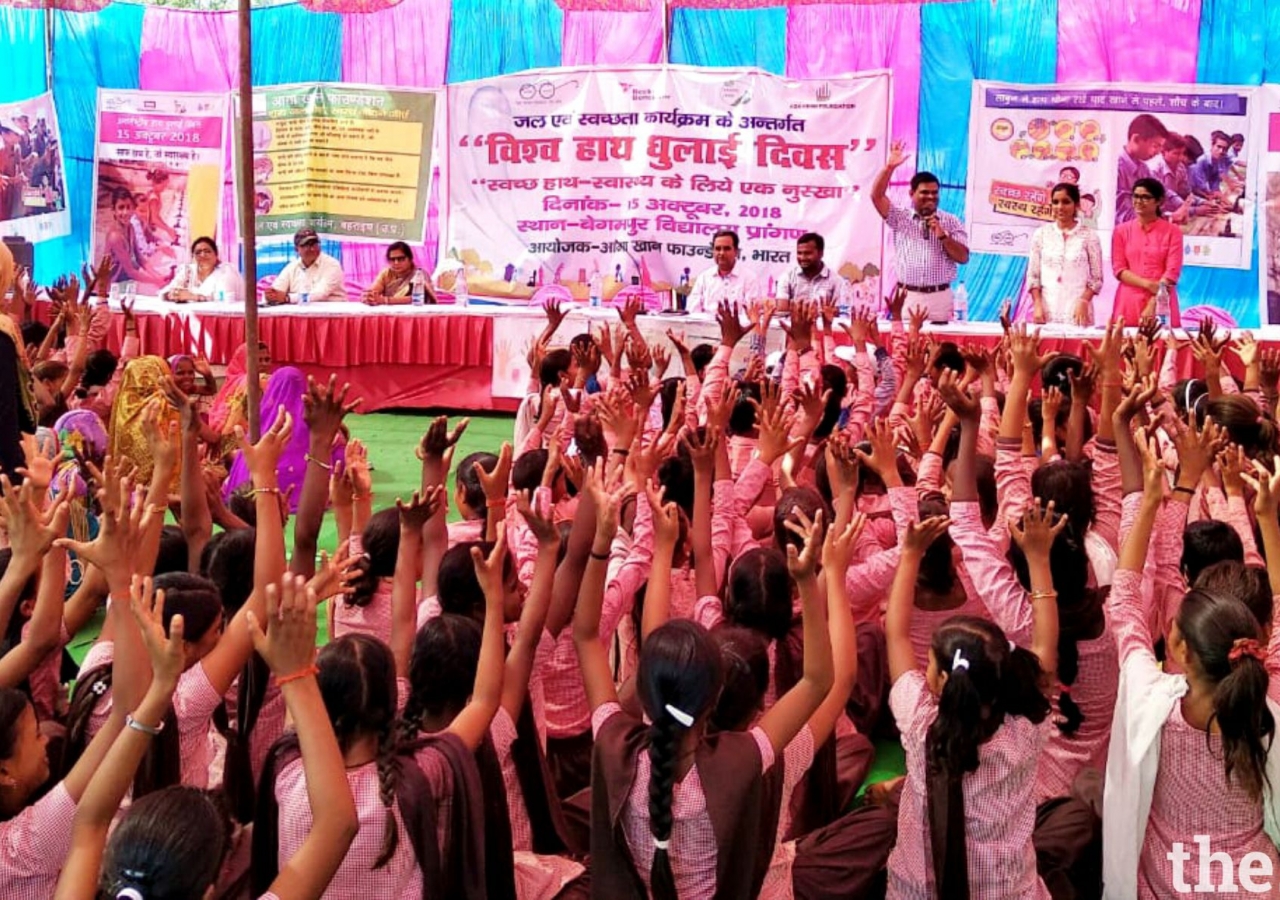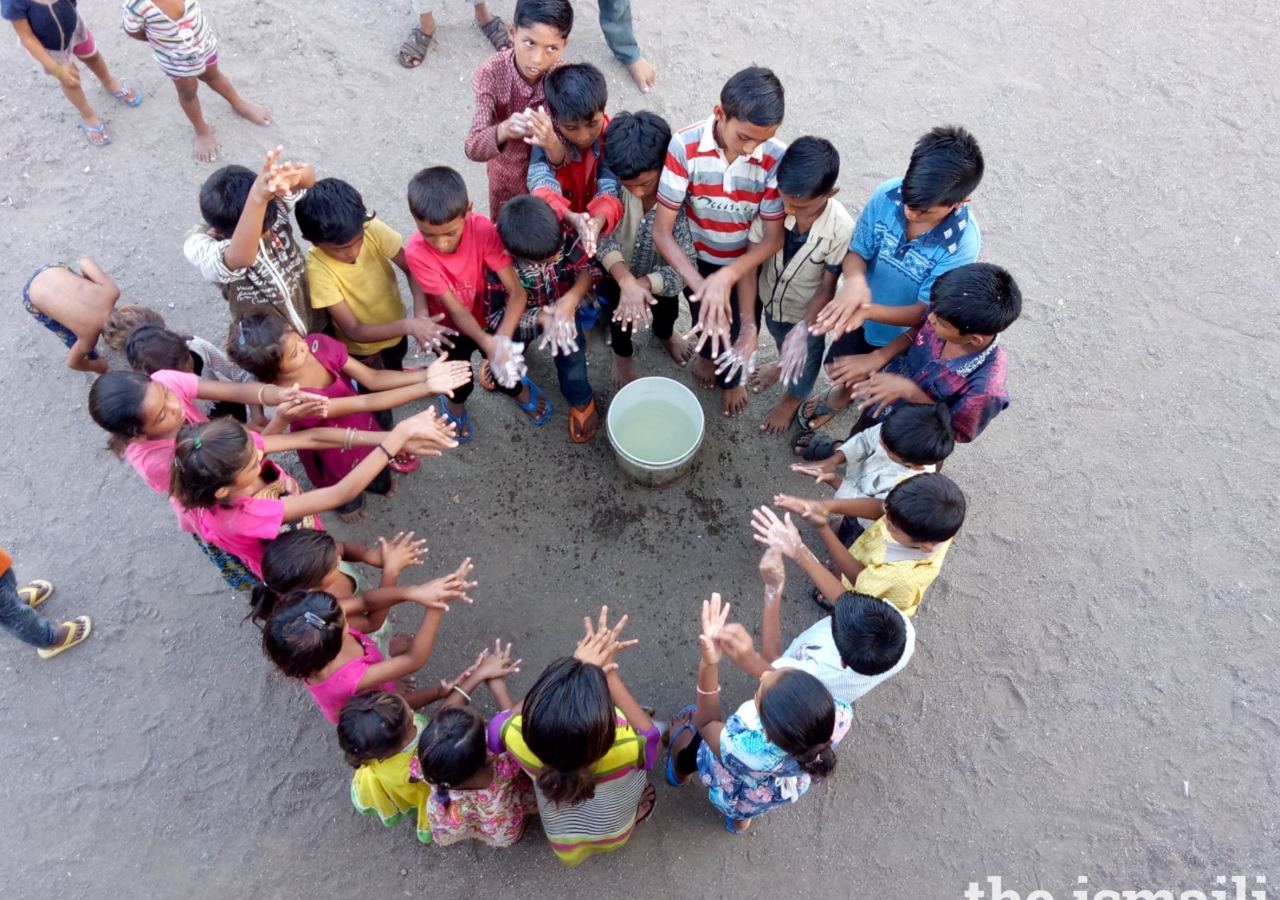With over 8.4 crore toilets built in the last four years under the Swachh Bharat (Clean India) Mission, the rural sanitation coverage of India has increased significantly, from 39 per cent in October 2014 to over 95 per cent in October 2018. The success of the Clean India Mission will undoubtedly have a significant impact on the global achievement of the Sustainable Development Goal 6.2 - that pertains to access to sanitation and hygiene for all. However, the real challenge going forward will be to sustain the Open Defecation Free (ODF) communities that have been created under the programme. In many rural settings where toilet use has never been an embedded cultural practice, it is critical to adopt approaches that ensure regular use of toilets by communities. A school focussed hygiene campaign can initiate a process of passing on improved hygiene behaviour related information from school to household to community thus helping to sustain ODF outcomes.
The Aga Khan Development Network with support from Reckitt Benckiser, is implementing its school hygiene education programme in the same geographies where it is implementing its larger community WASH initiative. The AKDN Comprehensive Sanitation Initiative, which was launched in 2015, is supporting the Swachh Bharat Mission, and is working to improve the quality of life of poor communities by facilitating access to water and sanitation for 100,000 poor households across six states in India, as well as by improving hygiene behaviours.
Layering hygiene education with a community sanitation initiative was a strategic approach adopted by AKDN to help sustain ODF efforts. Schools present a unique opportunity to engage students, parents and the wider community through demonstration and community outreach activities. Moreover, healthy hygiene practices, if initiated during childhood, are not only difficult to change but also influence a person’s future health, thus preparing entire generations and keeping them safe from the risk of water-borne diseases. For, AKDN, the provision of safe water, sanitation and hand washing facilities in schools is only the first step towards a healthy physical learning environment improving both learning and health outcomes. An equally important and critical intervention is hygiene education that promotes improved hygiene behaviours. Together, these conditions not only help children like Aranji learn better but also make it possible for messages to be taken back to children’s families and communities.
Aranji Kumar, a student of a primary school in Pusa, Bihar, understands this well. “After learning more about health and hygiene, things have really changed for the better at our school, and I can see it through the change within my classmates as well - handwashing before eating and after using the toilet is picking up.”
While the school system is fraught with faults, it does have established ties with the community. And it is this accessibility of school health programmes to a large proportion of the population that makes investments in this space, a cost effective strategy. Schools also provide a strong entry point to initiate discussions around often taboo topics such as menstrual hygiene. It is widely acknowledged that the lack of facilities, and improper awareness around safe management adversely affects school attendance for girls in these critical days. Building their knowledge and awareness on this key aspect, is also critical to the current interventions of AKDN and this is being done by engaging adolescent girls groups in schools and in communities.
Under the programme, children like Aranji, are being taught key lessons on personal hygiene, handwashing, hygiene at their homes and their awareness is also built on menstrual hygiene management. All of this is done through the use of learning aids such as games, posters and workbooks, in a play-way method, which ensures that the topic is interesting for children, and yet the key messages are communicated.
Several studies attest to the fact that using such innovative teaching methods is imperative to ensure students become active participants in the teaching-learning process and are able to learn and adopt key hygiene practices in their daily lives. With support from Reckitt Benckiser India, AKDN has introduced the three grade level hygiene curriculum in schools, with a focus on key elements like hygiene in schools, homes and neighbourhoods, personal hygiene, and hygiene during illness. Along with sessions, teachers are also being taught how to use the games and incorporate workbooks in their teachings - all of which have been developed through rigorous field testing and under the guidance of Late Dr Abdul Kalam.
In these schools, AKF is also working to build teacher’s capacities to introduce and streamline hygiene education, and is engaging closely with School Management Committees and parents to seek their support and active participation in the programme. This has resulted in student committees being empowered to drive forward these initiatives in their schools and students becoming hygiene ambassadors in their communities.
Mr. Ajay Sharma - Headmaster at Abupur Primary School, Phulwarisharif, Patna, sheds light on the impact of a school hygiene initiative, “To be very frank, we have so many responsibilities of our own that we would come to school, teach and leave. We wouldn’t even try and educate our kids about sanitation. After the introduction of the hygiene curriculum, we finally found a direction that we could act in, and the results have been phenomenal, there has been a visible change in the way children come to schools, and you can see they are adopting practices that are being taught”.
The AKDN approach of working in schools is also informed by the fact that school children are able to quickly grasp social messages and become effective agents of change in their communities by spreading these messages and that more than 40 percent of diarrhoea cases in school children result from transmission in schools rather than homes. Moreover, there is now very clear evidence showing the link between hygienic behavior and improved health: hand-washing with soap at critical times has been known to reduce the number of diarrhoea incidences by almost 50 per cent; good hygiene practices can also reduce the prevalence of respiratory infections, skin infections, and trachoma.
Aranji, also recently participated in an internal voting exercise conducted by AKDN, to understand the impact of hygiene messaging in schools and homes. It asked school going children to cast their vote on the status of sanitation usage in their homes and their communities. Children registered their responses in a closed ballot, and answered key questions such as usage of toilets by family members and status of open defecation in their communities. A total of 3697 children voted on this in the Pusa Block of Samastipur District in Bihar, where AKF in partnership with the Government has facilitated the achievement of ODF status for the entire block.
The results provide key insights: 70% of children voted to state that no family member defecates in the open. 14% of the children indicated that even though their homes had toilets, a few members of their family continued to defecate in the open. While 11% reported no sanitation facilities in their homes, a mere 5% recorded that not even a single member uses the toilets present in their homes.
Using these insights, AKDN is now strengthening its hygiene promotion programmes at the community level. In addition to working with district administration to facilitate access to those houses that lack toilet facilities, it is also engaging closely with those that do, to strengthen usage of existing facilities. All of this would not have been possible, without the insights provided by children - who understand the importance of hygiene, and can comment on the state of sanitation in their homes.
While AKDN has piloted this in one location, similar experiments are underway in three different locations across the states of Uttar Pradesh, Madhya Pradesh, Gujarat, and Patna City to further understand existing patterns of usage.
Indeed, WASH in schools programmes provide an entry point not just for raising awareness and changing behaviours, but also sustaining community. WASH efforts required to achieve two of the Sustainable Development Goals (SDGs): Goal 6 (Clean water and sanitation), and Goal 4 (Ensure inclusive and equitable quality education and promote lifelong learning opportunities for all). Fortifying the good habits at the onset of learning in children at school can have the dual advantage of sustaining long-term behaviours as well as reinforce the habits in their homes and community by identifying and honing them as change agents to carry forward the momentum.










